Ramadan
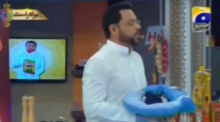
A controversial Muslim scholar-turned-television-host has given away at least two abandoned babies during his live TV show in Pakistan, saying “it is real Islam” and not exploitation because the infants find homes with couples who want to adopt.
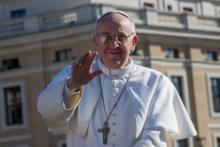
In message published on Friday, Pope Francis took the rare step of personally expressing his “esteem and friendship” to the world’s Muslims as they prepare to celebrate the end of the Ramadan fast.
While it is a long-established Vatican practice to send messages to the world’s religious leaders on their major holy days, those greetings are usually signed by the Vatican’s department for interfaith dialogue.
In his message, Francis explains that in the first year of his papacy he wanted to personally greet Muslims, “especially those who are religious leaders.”
Francis’ predecessor, Pope Benedict XVI, had fraught relations with Muslims. In a 2006 speech he quoted a Byzantine emperor who said Muhammad had only brought “evil and inhuman” things to the world, sparking a worldwide crisis in Christian-Muslim relations.
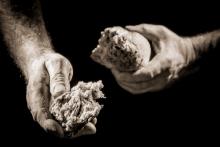
Last night, my wife Janny and I had the honor of sharing a table with a gathering of local Muslims for an Iftar meal. It is currently Ramadan, which means the Muslim community around the globe fasts everyday day from sunrise to sunset. No food. No water. No tobacco. No sex. Each night they have a celebration feast to break their daily fast called the Iftar meal. It is sacred, joyous, and a time to sit with those they love to worship the One they love, Allah (which is simply the Arabic translation of God).
It was into that sacred gathering that they expanded the table and pulled up a seat for us and a few other Christian and political leaders throughout San Diego. Their hope was simply to create space in their daily practice for their neighbors to experience life with them. They were both acknowledging city leaders who have been proactive in creating an environment of dignity and mutual relationship, and creating a space for new/renewed understanding of one another. Acknowledging our core faith differences, they made clear that it should in no way detract from our ability to share a common vision for the good of our city. We are neighbors who live, work, and play on the same streets with a common desire to see deep, charitable relationships, sustainable economy, and mutual understanding and a celebration of diversity.
As I often say, as followers of Jesus, we have no choice but to move toward relationships with those who are marginalized, dehumanized, and in need of love. We don’t compromise our faith by hanging out with people we may or may not agree with. No, in fact, we reflect the very best of our faith.

When it comes to donating to charity, Britain’s small but fast-growing Muslim community comes out ahead of other religious groups, a recent survey shows.
Conducted by ICM, a London-based polling agency, the survey shows the U.K.’s estimated 280,000 Muslims report giving more money annually to charity than Christians, Hindus, Sikhs, and Jews.
The survey, conducted on behalf of JustGiving, an online giving platform, also found a 70 percent rise in giving over the past two years from among Muslims to the charity-giving site.

With a stated aim to “provoke,” Britain’s best-known TV company, Channel 4, is justifying its live daily broadcast of the “adhan” — the early hour Muslim call to prayer — and sparking applause as well as anger.
The broadcasts, airing each morning at 3 a.m. Greenwich Mean Time, will continue throughout the Muslim holy month of Ramadan.
“We are focusing on the positive aspects of Islam and hoping to explain to a broader public what Ramadan is, and what it means for the 2.8 million Muslims who take part in the UK and provide a platform for different views and different voices,” said Ralph Lee, the network’s head of programming.
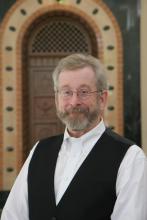
Most people have heard of Hanukkah and Passover and maybe Yom Kippur — the Jewish Day of Atonement. But Tisha B’Av?
Translated as the ninth day of the Hebrew month of Av, it counts as one of the most important days on the Jewish calendar. But even many Jews have not heard of this period of mourning, which requires a 25-hour fast to commemorate the destruction of the First and Second Temples in Jerusalem.
Tisha B’Av, many rabbis say, can be a tough sell, in part because a radical group of far-right Jews wants to rebuild the temple on the site of what is now the Al-Aqsa Mosque, one of Islam’s most revered sites.
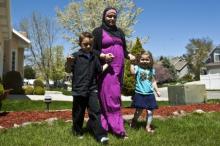
SALT LAKE CITY — Every day. For a month. From sunup to sundown. No food. No water.
No sweat?
No, plenty of sweat, especially this year.
With Utahns baking under energy-sapping, forehead-dripping, water-chugging temperatures, the state’s Muslims are swearing off that liquid life force during the heat of the day — and the morning, and the evening.
The annual 30-day fast known as Ramadan, one of Islam’s five pillars, began Tuesday and requires that believers forgo food and drink. At this time of year, that means 15 hours of parched throats and unquenched thirst.
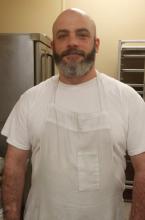
Since converting to Islam more than five years ago, Paul K. DeMelto of Cleveland has done all he could to become a more knowledgeable Muslim, attending a new converts class and hiring Arabic tutors to help him learn to read the Quran.
But despite his efforts, DeMelto found himself alone last Ramadan, the holiest month of the Muslim year, when adherents fast from sunrise to sunset and eat a communal meal at night.
As he looks to another Ramadan beginning today, DeMelto wonders if this might be the year when he finally lands an invitation to a fellow Muslim’s home for the iftar, the fast-breaking meal.

Due to a temporary relaxation in Israeli policy, many Palestinians traveled to Jerusalem through checkpoints during Ramadan this year. But now that Ramadan is over, it’s back to business as usual.
Every day, thousands of Palestinians circumvent the Israeli separation wall by crossing into Jerusalem without permission from Israeli authorities. Israeli journalist Haggai Matar recently described this major flaw in the wall’s security rationale, even quoting a pro-barrier activist who admits:
“'There’s no problem crossing the gaps in the fence and tens of thousands of illegal workers cross it back and forth every day, and there should be no problem getting suicide bombers through with them,” stresses Ilan Tsi’on, co-founder of 'A Fence for Life.' 'So why don’t they? Because that’s the Palestinians’ choice.'”
The same logic applies to the checkpoints controlling movement within territory under Israeli occupation since 1967 — including East Jerusalem, which contains the Old City, the Haram Al-Sharif (or Temple Mount), and the Al-Aqsa Mosque. Though Israel unilaterally annexed East Jerusalem, no other nation recognizes the legitimacy of the action and international consensus still regards it as occupied Palestinian territory. That so many Palestinians routinely risk arrest and prison by circumventing these checkpoints — without incident — shows that their security rationale is absurd. While at the same time, the vast majority of Palestinians who try to play by the rules of occupation remain restricted under Israel’s matrix of control.
Interethnic violence has flashed through India during the conclusion of the Muslim holy season of Ramadan during which Muslims fast from sunrise to sunset. Catholic leaders in northern India, where Muslim migrants have been particularly targeted, has called for common ground dialogue and hosted meetings with leaders of the conflicted communities based on the Catholic churches long-standing relationships with both communities.
Anto Akkara for ENI NEWS reports:
"Churches are initiating steps to broker peace and restore harmony in the northeast Indian state of Assam, which has been rocked by bloody clashes between local ethnic Bodo people and Muslim migrants.
'We have hosted leaders of both communities twice already. We are now preparing a larger meeting of both communities after Ramadan,"'Roman Catholic bishop Thomas Pulloppillil of Bongaigaon diocese that comprises the troubled region, told ENInews on 15 August 2012.
The clashses have left 78 dead and over 400,000 refugees."
Read the rest of the article here.
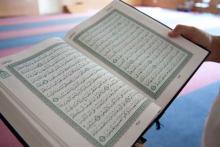
This year during Ramadan — the ninth month of the Islamic lunar calendar when Muslims believe the Quran was first revealed to the Prophet Muhammad — I was in solidarity with my Muslim sisters and brothers throughout the world by reading the Quran. But here's the thing: I am a Roman Catholic.
My copy of the Quran, with more than 1,700 pages, has sat on the top shelf of my bedroom bookcase among other sacred texts for 14 years. Typically I would use it as a sporadic reference and resource to better understanding Islam, reading a few short passages at a time.
However, this Ramadan something at the core of my being was calling me to read the Quran in its entirety. And so my monthlong Ramadan journey began.
Each day and evening, the prayerful poetry in the Quran held me in a meditative mode of peace as I read without being aware of the passage of time.
When I finished reading a week before the end of the month, I felt as if the Quran was almost endless, reaching beyond the confines of my calendar days. I didn’t want to read the last page. I didn’t want to be finished.
The Quran inspired me, taught me and helped me to remember my essential holiness and how that holiness in the image of God should be reflected in the world.
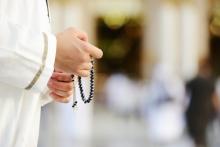
Following attacks on seven U.S. mosques in the last two weeks, including three attacks last weekend, many Muslim Americans are approaching the end of Ramadan on Aug. 19 under a cloud of fear as Muslim groups try to increase security without spurring panic.
According to reports, vandals shot paintballs at the Grand Mosque of Oklahoma City on Aug. 12, and in Lombard, Ill., someone threw a bottle filled with acid at an Islamic school while 500 people prayed inside. The night before, a neighbor fired an air rifle at the Muslim Education Center in Morton Grove, Ill., while on Aug. 7, two women were videotaped throwing pig legs on a proposed mosque site in Ontario, Calif.
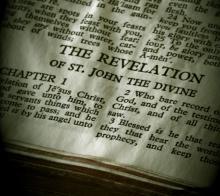
It was the summer of 1994 and about 10 friends and I sat huddled around Bibles in my friend’s living room. It was a “scripture party.” The lights were dim and the air was full of anticipation and mystery. We did not know what God might reveal as we opened the book of Revelation and read it out loud, in community, in one night.
This bears resemblance to the way the early church would have read the scripture. They were an oral culture, not a written one. The Hebrew Bible was written on scrolls that were read aloud to congregations. Most of the New Testament was written as letters to the worshiping bodies of whole cities (i.e. the saints in Ephesus, the church in Philippi, the body in Corinth, etc.). When received, the letters would be read out loud to the whole church community and received as God’s instruction revealed through the apostles for the edification of their communities.
Imagine being one of the very first followers of the Jesus “Way” (Acts 9:2).
Imagine being a persecuted religious group. You have to use code — the sign of the ichthys — to identify yourself to other believers for fear of religious persecution. Only when you are gathered together in secret can you speak openly about your faith. Only then can you be fully known and appreciated for the whole image of God that lives inside of you.
Imagine huddling in a secret meeting place and reading the Apostle John’s Revelation of Jesus Christ for your nascent faith community in Ephesus or Smyrna, or Pergamum, or Thyatira, or Sardis, or Philadelphia, or Laodicea (Revelation 2-3). Imagine living in Ephesus and reading Paul’s prayer for your church to understand its hope and inheritance (Ephesians 1:17-2:22).
And imagine being rich in the early church and hearing James’ letter warning: “Listen! The wages of the laborers who mowed your field, which you kept back by fraud, cry out, and the cries of the harvesters have reached the ears of the Lord of hosts.”
Imagine hearing it all for the first time. It all feels so real. The call to holiness feels so urgent because God feels so present.
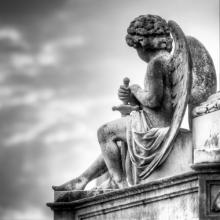
I’m on day 14 of my Ramadan fast — almost the halfway point. My schedule has been so scattershot with travel that I haven’t been able to make it to a mosque yet. Nonetheless, lightheadedness brought on by lack of water and sleep has become my new normal.
I asked Daisy Khan, Imam Feisal’s wife and the Executive Director of the American Society of Muslim Advancement: “What about sleep? How do people do it?” She explained, during Ramadan we live like angels. Angels don’t need sleep. They don’t need food or water.
“But how do they do it, physically?” I pressed.
“Spiritual energy,” Daisy said.
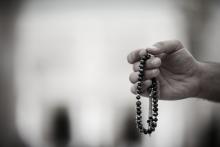
After two days of deep and unwavering pangs of hunger and thirst that had to wait for sundown to be filled, I had an epiphany: In the same way that I waited eagerly for the breaking of the Ramadan fast each night — counting it as something to celebrate — on the day Jesus comes again, we will celebrate. On that day there will be no injustice anymore. Imagine it! There will be no hunger anymore! There will be no one who is thirsty anymore! All will have their fill! All will taste the sweetness of life! All will be free of oppression! All will be able to laugh and play, and no one will be lonely any more.
Then it struck me: Ramadan offers an emphatic example of what is to come. Just as the community of creation suffers and groans waiting for all the relationships broken at the Fall to be made right again (Romans 8:18-23), so the communities that practice Ramadan suffer and grow together each day, waiting for their very bodies to be made right again each night through the intake of food and water.
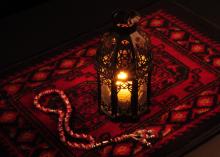
EDITOR'S NOTE: Ramadan's first day of fasting began today at dawn. This year, Sojourners' Director of Mobilizing, Lisa Sharon Harper, has chosen to keep the fast during the Muslim holy month alongside our friend, Imam Feisal Abdul Rauf. Both Lisa and Imam Feisal will be blogging regularly during the coming days and weeks of Ramadan, sharing with our readers their personal reflections on what the holy month, the fast and journeying together as a Christian and a Muslim means to them. To learn more about Ramadan and its sunrise-to-sunset monthlong fast, click HERE.
LISA SHARON HARPER:
In 2004 I led a group of Intervarsity students on a journey through Croatia, Bosnia, and Serbia on a Pilgrimage for Reconciliation. For four weeks we traveled throughout all three countries investigating the roots of conflict and seeds of peace being planted between the Catholic Croatians, Muslim Bosniaks, and Orthodox Serbs. Along the way, we met with Miroslav Volf, who was vacationing in his home country of Croatia at the time. One of my students asked Volf the same question I asked my mentor years before: “How do you engage in interfaith activity without watering down your own faith?” Volf answered with one word: “Respect.”
He explained that Jesus says the greatest commandment is to love God and to love our neighbors as we love ourselves. Love requires respect. We may not agree with our neighbors, but we must respect their minds and their ability to choose the faith they will practice...
That is why I have chosen to embrace my Muslim neighbors by practicing the Fast of Ramadan this year with a spiritual leader who I admire and look forward to learning from, Imam Feisal Abdul Rauf.

This year, more than 3,000 Muslim athletes will compete in the Olympics, but many will not fast, a decision that has been sanctioned by religious authorities. While Muslims are increasingly common on Western teams -- for example British rower Mohamed Sbihi and French boxer Rachid Azzedine -- no Muslims made the U.S. team this year.
Nyambui said the hard part about track is training. Competing is easy. Had Ramadan occurred before the Olympics, when athletes prepare their bodies for competition, then his performance would have suffered, he said. He acknowledged that fasting can present difficulties for athletes, but usually only during the first or second weeks of Ramadan when the body is still adjusting to the rigors of fasting.
“After that people are used to it,” said Nyambui, speaking from his office in Dar es Salaam, Tanzania's largest city. “People play soccer, they can go jogging, they can go swimming.”
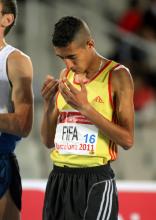
It’s just 10 days until the biggest show on earth begins.
No, not Lady Gaga’s new tour. It's the 2012 Summer Olympics in London.
The timing of this year’s Olympics has put thousands of participating athletes in something of a quandary.
Writing from TIME Magazine, Aryn Baker explains:
When an estimated 3,500 Muslim athletes come to the London Olympics this summer, the pinnacle of their athletic careers will directly coincide with one of the most important periods in their spiritual calendar. This year, all 17 days of athletic competition take place during the holy month of Ramadan, when Muslims are required to fast and refrain from drinking water from sunrise to sunset....
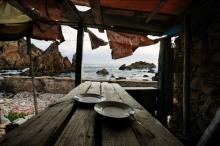
In February of 2009, when I tried a month-long Ramadan fast for the book Flunking Sainthood, I felt like a failure for most of the month.
Fasting was not a practice I ever cheated on (weirdly, it was easier for me to give up food completely in February than it was just to be a vegetarian in October of that year, when I did cheat -- how lame is that?). But I never felt like I fully "got" it. I did feel unexpectedly relaxed at the end of February -- and, let's face it, a bit smug that I'd persevered through the experience -- but not much more spiritual than when I started.
I think it's because I had the wrong attitude to begin with.